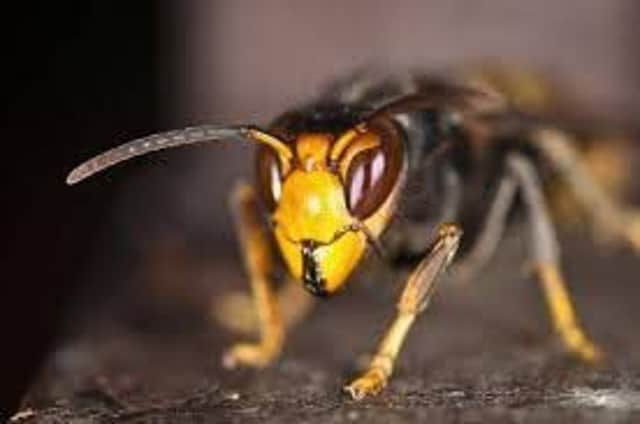Killer hornet could spell disaster for Lincolnshire bee population


That’s the warning from Horncastle’s veteran beekeeper Fred Parker.
Mr Parker, a former chairman of the county’s beekeepers, says the Asian Hornet could also be a threat to the public.
Advertisement
Hide AdAdvertisement
Hide AdHis comments follow the discovery of an Asian Hornet on a cauliflower in Cheshire.
The cauliflower was grown in the Boston area, sparking fears the Asian Hornet could have established a nest somewhere in Lincolnshire.
Mr Parker, who is chairman of the Horncastle Beekeeping Club, said: “Make no mistake, this hornet could cause havoc. It’s vicious.
“We’ve been expecting it might arrive in this area - but not so soon.
Advertisement
Hide AdAdvertisement
Hide Ad“If it is established in Lincolnshire, then it is very worrying.”
Mr Parker explained that apart from killing resident British bees, the Asian Hornet can attack members of the public.
He explained: “It’s smaller than a usual hornet but it is a lot more aggressive.
“If just one of them attacks you when you are out and about, there could be hundreds more.
Advertisement
Hide AdAdvertisement
Hide Ad“It’ll kill our bees. They’ll either get into hives or catch bees on the wing, take them back to their nest and eat them.”
Mr Barker - one of the country’s top beekeeping experts - said he hoped the Cheshire discovery was a one-off.
He added: “Hopefully, it is an isolated incident but if they have got a nest, then we’re in trouble.”
Mr Barker stressed the National Bee Unit were ready to act and destroy any Asian Hornet nests.
He also advised beekeepers to put hornet traps on hives.
If the Asian Hornet is found in Lincolnshire, it’s not clear how it arrived although Mr Parker expects it used favourable winds to fly over the English Channel.